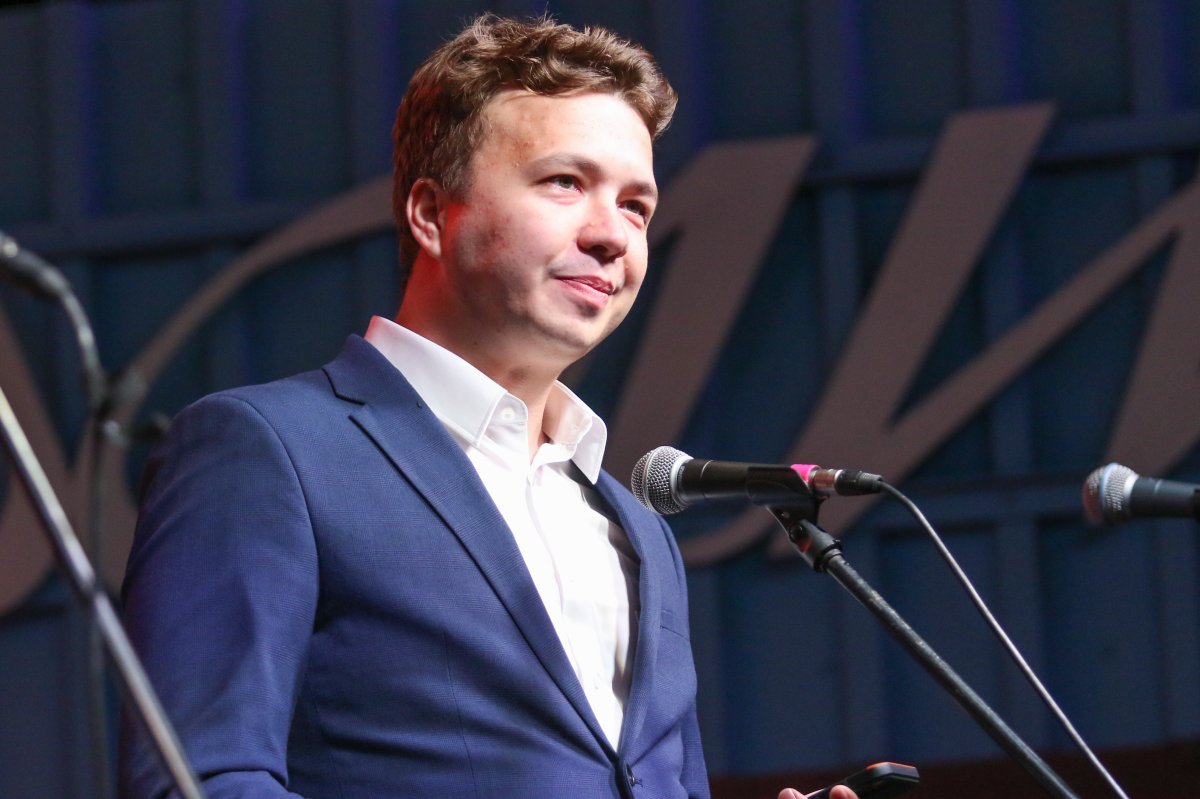A United Nations agency is launching an investigation into Belarus‘s arrest of a dissident journalist after his flight was diverted on dubious pretenses last Sunday.

The governing body of the Montreal-based International Civil Aviation Organization (ICAO) said Thursday it will open a fact-finding probe into “the apparent forced diversion” of the airliner, which saw Belarusian authorities detain journalist Roman Protasevich and his girlfriend Sofia Sapega.
The investigation will seek to determine whether there was a breach of international aviation law. It is unclear what else might result from the report by the secretariat of the ICAO, a specialized agency with minimal authority over sovereign states.
The announcement comes after pleas from G7 officials and an urgent meeting of the 36-member ICAO council Thursday morning.
Earlier that day, the G7 said it will ramp up its efforts to hold Belarus accountable for arresting the duo, though additional penalties have yet to be nailed down.
The countries’ foreign ministers, along with a European Union representative, said they will impose “further sanctions as appropriate,” condemning the act as an attack on press freedom and civil aviation rules.

The EU has already moved to ban Belarusian airlines from its skies, advised EU carriers to steer clear of flights over the country and pledged further economic sanctions.
On Sunday, Belarusian air traffic controllers diverted a Ryanair flight between Greece and Lithuania to Belarus’s capital, Minsk, claiming there was a bomb threat.
On the ground, authorities detained Protasevich and Sapega, who both later appeared in videos under apparent duress.
Transport Canada urged Belarus to release all individuals who have been arbitrarily detained and called on it to co-operate with a council investigation.
“Canada remains deeply concerned by the ongoing crackdown against journalists and peaceful protesters by the Belarusian government,” the department said in an email Thursday.
Transport Canada on Tuesday posted an “airspace security warning in response to unusual excessive measures by Belarus,” advising airlines against flying over the country.
Belarus charges euro-denominated fees to use its airspace. The largest flights cost the equivalent of more than $400 and amount to millions in state revenue each year, estimated Robert Kokonis, president of Toronto-based consulting firm AirTrav Inc.
Nonetheless, the sudden drop in air travel represents a relatively small earnings dent, particularly with countries such as Russia and Turkey continuing to cruise over Belarusian skies.

On Tuesday, Prime Minister Justin Trudeau echoed European Commission President Ursula von der Leyen and U.S. President Joe Biden in calling Sunday’s brazen act “an attack on democracy” and freedom of the press.
“The behaviour of the Belarus regime is outrageous, illegal and completely unacceptable,” Trudeau said.
The same day, the Belarusian Embassy in Ottawa announced it will shut its doors, stating in a website post that activity will be suspended as of Sept. 1. The statement made no reference to international outrage over the recent incident.
Canada announced sanctions against 55 Belarusian officials last year after an election that Global Affairs Canada said was “marred by widespread irregularities” amid a “systemic campaign of repression” and human rights violations under President Alexander Lukashenko, who has served in the office since its creation in 1994.
- Canada refused to repatriate woman from ISIS camp because she can’t be arrested: internal memo
- Spain’s PM considers resigning amid wife’s legal probe: ‘Is it all worth it?’
- Russia vetoes UN resolution to prevent nuclear arms race in space
- Is Trump immune in the 2020 election case? What to watch for during hearing
He was sworn in for a sixth term after a landslide election victory last August that sparked countrywide protests and global backlash over a vote that was widely seen as fraudulent.
Protasevich, 26, is part of a disparate group of Belarusian journalists and activists campaigning in exile against the president’s 27-year reign.
He co-founded the Telegram channel Nexta, which has helped rally anti-Lukashenko demonstrations, landing him on a wanted list for terrorism in 2019. The state charged Protasevich in absentia last year with “organizing mass riots and group actions that grossly violate public order.”
He was travelling on Ryanair Flight 4978 from Athens to Vilnius, Lithuania, on Sunday afternoon when air traffic control, assisted by a Belarusian fighter jet, prompted the plane to turn around and make an emergency landing at the Minsk airport.

Marcus Kolga, a human-rights activist and senior fellow at the Macdonald-Laurier Institute, said the EU ban on Belarus’s state-owned airline Belavia marks “a good first step,” along with western government warnings to avoid Belarusian airspace.
More hardline economic penalties are also available.
Western countries could curb Belarus’s sovereign debt market by barring their financial institutions from buying bonds from its central bank, as the United States did with Russia last month.
They could stymie Lukashenko’s access to the global banking system by banning Belarus from SWIFT, a Brussels-based electronic network used by more than 11,000 financial institutions to transfer money and information.
Canada should also look to fund programs that support families of the thousands of victims of government crackdowns over the past couple years, Kolga said, as well as lend a hand to media that report on Belarus from abroad.
“There is no independent media left in Belarus. Anyone that was operating as a journalist has either been thrown in prison and remains in prison or they’re in exile,” he said.
Despite the risk of pushing Belarus further into Russia’s orbit, Canada must work with other liberal democracies to halt “transnational repression” by Belarus, Russia and other authoritarian states that has spilled beyond their borders in the form of attempted poisonings, election interference and other tactics, he said.



Comments